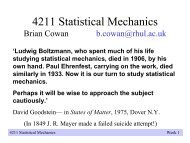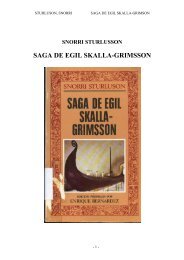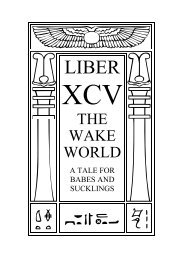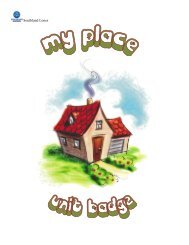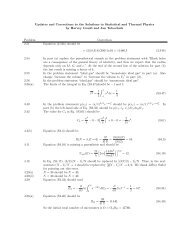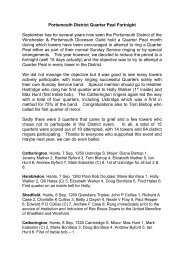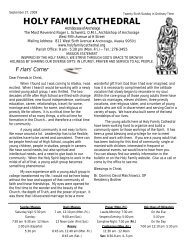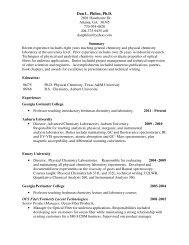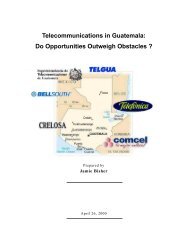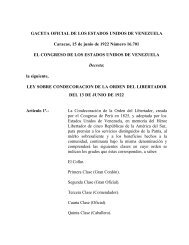Essays on Suicide and the Immortality of the Soul: - WebRing
Essays on Suicide and the Immortality of the Soul: - WebRing
Essays on Suicide and the Immortality of the Soul: - WebRing
You also want an ePaper? Increase the reach of your titles
YUMPU automatically turns print PDFs into web optimized ePapers that Google loves.
ESSAYS ON SUICIDE AND THE IMMORTALITY OF THE SOUL<br />
<strong>and</strong> <strong>on</strong>ly agree in sharing <strong>the</strong> miseries <strong>of</strong> life in comm<strong>on</strong>. If you required authorities <strong>and</strong><br />
facts, I could recite you <strong>the</strong> oracles <strong>of</strong> old, <strong>the</strong> answers <strong>of</strong> <strong>the</strong> sages, <strong>and</strong> produce instances<br />
where acts <strong>of</strong> virtue have been recompensed with death. But let us leave <strong>the</strong>se<br />
c<strong>on</strong>siderati<strong>on</strong>s, my lord; it is to you whom I address myself, <strong>and</strong> I ask you what is <strong>the</strong> chief<br />
attenti<strong>on</strong> <strong>of</strong> a wise man in this life, except, if I may be allowed <strong>the</strong> expressi<strong>on</strong>, to collect<br />
himself inwardly, <strong>and</strong> endeavour, even while he lives, to be dead to every object <strong>of</strong> sense?<br />
The <strong>on</strong>ly way by which wisdom directs us to avoid <strong>the</strong> miseries <strong>of</strong> human nature, is it not to<br />
detach ourselves from all earthly objects, from every thing that is gross in our compositi<strong>on</strong>,<br />
to retire within ourselves, <strong>and</strong> to raise our thoughts to sublime c<strong>on</strong>templati<strong>on</strong>s? If <strong>the</strong>refore<br />
our misfortunes are derived from our passi<strong>on</strong>s <strong>and</strong> errors, with what eagerness should we<br />
wish for a state which will deliver us both from <strong>the</strong> <strong>on</strong>e <strong>and</strong> <strong>the</strong> o<strong>the</strong>r? What is {76} <strong>the</strong> fate<br />
<strong>of</strong> those s<strong>on</strong>s <strong>of</strong> sensuality, who indiscreetly multiply <strong>the</strong>ir torments by <strong>the</strong>ir pleasures? <strong>the</strong>y<br />
in fact destroy <strong>the</strong>ir existence by extending <strong>the</strong>ir c<strong>on</strong>necti<strong>on</strong>s in this life; <strong>the</strong>y increase <strong>the</strong><br />
weight <strong>of</strong> <strong>the</strong>ir crimes by <strong>the</strong>ir numerous attachments; <strong>the</strong>y relish no enjoyments, but what<br />
are succeeded by a thous<strong>and</strong> bitter wants; <strong>the</strong> more lively <strong>the</strong>ir sensibility, <strong>the</strong> more acute<br />
<strong>the</strong>ir sufferings; <strong>the</strong> str<strong>on</strong>ger <strong>the</strong>y are attached to life, <strong>the</strong> more wretched <strong>the</strong>y become.<br />
But admitting it, in general, a benefit to mankind to crawl up<strong>on</strong> <strong>the</strong> earth with gloomy<br />
sadness, I do not mean to intimate that <strong>the</strong> human race ought with <strong>on</strong>e comm<strong>on</strong> c<strong>on</strong>sent to<br />
destroy <strong>the</strong>mselves, <strong>and</strong> make <strong>the</strong> world <strong>on</strong>e immense grave. But <strong>the</strong>re are miserable beings,<br />
who are too much exalted to be governed by vulgar opini<strong>on</strong>; to <strong>the</strong>m despair <strong>and</strong> grievous<br />
torments are <strong>the</strong> passports <strong>of</strong> nature. It would be as ridiculous to suppose that life can be a<br />
blessing to such men, as it was absurd in <strong>the</strong> sophister Possid<strong>on</strong>ius to deny that is was an<br />
{77} evil, at <strong>the</strong> same time that he endured all <strong>the</strong> torments <strong>of</strong> <strong>the</strong> gout. While life is<br />
agreeable to us, we earnestly wish to prol<strong>on</strong>g it, <strong>and</strong> nothing but a sense <strong>of</strong> extreme misery<br />
can extinguish <strong>the</strong> desire <strong>of</strong> existence; for we naturally c<strong>on</strong>ceive a violent dread <strong>of</strong> death, <strong>and</strong><br />
this dread c<strong>on</strong>ceals <strong>the</strong> miseries <strong>of</strong> human nature from our sight. We drag a painful <strong>and</strong><br />
melancholy life, for a l<strong>on</strong>g time before we can resolve to quit it; but when <strong>on</strong>ce life becomes<br />
so insupportable as to overcome <strong>the</strong> horror <strong>of</strong> death, <strong>the</strong>n existence is evidently a great evil,<br />
<strong>and</strong> we cannot disengage ourselves from it too so<strong>on</strong>. Therefore, though we cannot exactly<br />
ascertain <strong>the</strong> point at which it ceases to be a blessing, yet at least we are certain in that it is<br />
an evil l<strong>on</strong>g before it appears to be such, <strong>and</strong> with every sensible man <strong>the</strong> right <strong>of</strong> quitting<br />
life is, by a great deal, precedent to <strong>the</strong> temptati<strong>on</strong>.<br />
This is not all. After <strong>the</strong>y have denied that life can be an evil, in order to bar our right <strong>of</strong><br />
making away with ourselves; <strong>the</strong>y c<strong>on</strong>fess immediately afterwards that it is an {78} evil, by<br />
reproaching us with want <strong>of</strong> courage to support it. According to <strong>the</strong>m, it is cowardice to<br />
withdraw ourselves from pain <strong>and</strong> trouble, <strong>and</strong> <strong>the</strong>re are n<strong>on</strong>e but dastards who destroy<br />
<strong>the</strong>mselves. O Rome, thou victrix <strong>of</strong> <strong>the</strong> world, what a race <strong>of</strong> cowards did thy empire<br />
produce! Let Arria, Ep<strong>on</strong>ina, Lucretia, be <strong>of</strong> <strong>the</strong> number; <strong>the</strong>y were women. But Brutus,<br />
Cassius, <strong>and</strong> thou great <strong>and</strong> divine Cato, who didst share with <strong>the</strong> gods <strong>the</strong> adorati<strong>on</strong> <strong>of</strong> an<br />
ast<strong>on</strong>ished world, thou whose sacred <strong>and</strong> august presence animated <strong>the</strong> Romans with holy<br />
zeal, <strong>and</strong> made tyrants tremble, little did thy proud admirers imagine that paltry<br />
rhetoricians, immured in <strong>the</strong> dusty corner <strong>of</strong> a college, would ever attempt to prove that<br />
thou wert a coward, for having preferred death to a shameful existence.<br />
O <strong>the</strong> dignity <strong>and</strong> energy <strong>of</strong> your modern writers! How sublime, how intrepid are you with<br />
your pens? but tell me, thou great <strong>and</strong> valiant hero, who dost so courageously decline <strong>the</strong><br />
battle, in order to endure <strong>the</strong> pain <strong>of</strong> living somewhat l<strong>on</strong>ger; when spark <strong>of</strong> fire {79} lights<br />
up<strong>on</strong> your h<strong>and</strong>, why do you withdraw it in such haste? how? are you such a coward that<br />
you dare not bear <strong>the</strong> scorching <strong>of</strong> fire? nothing, you say, can oblige you to endure <strong>the</strong><br />
burning spark; <strong>and</strong> what obliges me to endure life? was <strong>the</strong> creati<strong>on</strong> <strong>of</strong> a man <strong>of</strong> more<br />
difficulty to Providence, than that <strong>of</strong> a straw? <strong>and</strong> is not both <strong>on</strong>e <strong>and</strong> <strong>the</strong> o<strong>the</strong>r equally <strong>the</strong><br />
work <strong>of</strong> his h<strong>and</strong>s?<br />
Without doubt, it is an evidence <strong>of</strong> great fortitude to bear with firmness <strong>the</strong> misery which we<br />
cannot shun; n<strong>on</strong>e but a fool, however, will voluntarily endure evils which he can avoid<br />
without a crime; <strong>and</strong> it is very <strong>of</strong>ten a great crime to suffer pain unnecessarily. He who has<br />
not resoluti<strong>on</strong> to deliver himself from a miserable being by a speedy death, is like <strong>on</strong>e who<br />
would ra<strong>the</strong>r suffer a wound to mortify, than trust to a surge<strong>on</strong>'s knife for his cure. Come,<br />
Get any book for free <strong>on</strong>: www.Abika.com<br />
20



